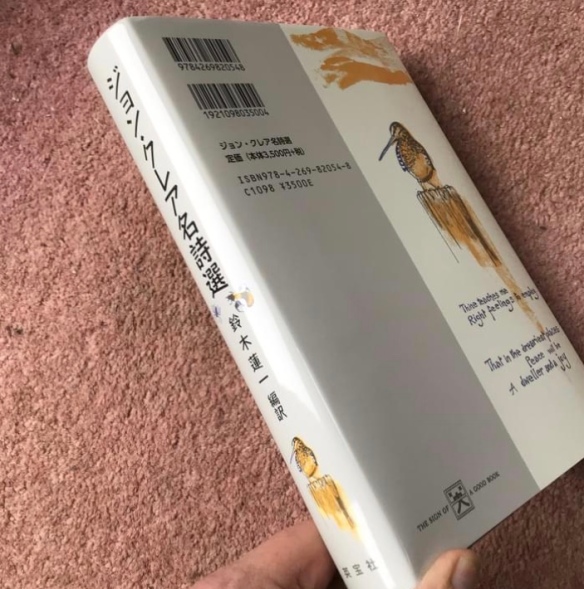This is an unusual review in that it is of a Japanese publication, written in Japanese, and containing translations into Japanese of some of John Clare’s most memorable poems and considerations on them and John Clare himself. The Review is by poet and artist
Yuko Minamikawa Adams.
Renichi Suzuki selects and translates, John Clare Meishisen (Selected Poems of John Clare)
Tokyo: Eihosha Co., Ltd, March 2021.
ISBN 978-4-269-82054-8
400 pages, JPY3850
This is Renichi Suzuki’s second translation into Japanese of John Clare’s poems. He began reading Clare’s work more than forty years ago. The first book was the translation of John Clare (Everyman’s Poetry Series 27) edited by R. K. R. Thornton. In his afterword, Suzuki mentioned that after the first publication, he became keener to translate other important poems by Clare so that many more Japanese readers may get to know his poems and recognise the importance of his work. There are 45 poems included in this book, which were all selected by Suzuki. As well as nature and ecology themed poems, he chose the poems which are about politics, the social system and love such as To the Snipe, The Lamentations of Round-Oak Waters, Child Harold, Don Juan, Mary (It is the evening hour…). The book cover illustrated by Carry Akroyd beautifully represents the atmosphere of Clare’s poems.
Poetry translation is usually very challenging and one needs to overcome another hurdle when the original work is written in the past – in this case, more than 100 years ago. There may be slight changes in the meaning of words over time and you really have to have a thorough understanding of language used in the past as well as the skill to convert them into a target language, which has to be easily understood by modern readers. In spite of these obstacles, Suzuki’s longtime appreciation of Clare’s poems has made possible a Japanese version of his poetry, which is comfortable to read without impairing the natural flow of Japanese language. I can hear Clare’s voice through Suzuki’s Japanese translation.
In addition to translation, Suzuki includes footnotes for each poem, expounding the interpretation by himself and other researchers, specific names of animals and plants, historical backgrounds and reasons why he chose certain Japanese words for translation. They are of great help to the readers who are not familiar with the situation of the time and the place where the poet lived. For example, in a footnote for the poem To the Snipe, he explains that ‘The little sinky foss’ in the sixteenth stanza shows that the fen where the snipe lived had been partially cultivated. I could have easily overlooked this fact and my impression about this poem should have been different. As for the poem The Gypseys Song, he translated the word ‘free’ in the fifth line into a word ‘tada de’, which means ‘at no cost’ in Japanese. (The gipsy’s life is a merry life, / And ranting boys we be; / We pay to none or rent or tax, / And live untith’d and free.) At the same time, he noted his view that this word ‘free’ also connotes the meaning of being able to do what you want, in consideration of the lines ‘While echo fills the woods around / With gipsey liberty’ and ‘Our maidens they are fond & free’ in the same poem. As it isn’t always possible for one word in one language to have same varieties of meaning in an equivalent word in another language, this type of explanation is very useful to bridge partial discrepancies between two languages.
It is heart-warming to read the episode about his encounter with Clare’s poems, which is written in his afterword. He first read his work at the lecture on the history of English literature by Professor Naonori Yanami. When Suzuki borrowed a book from the professor, he found Yanami’s translation of Little Trotty Wagtail between the pages. Yanai also gave him words of encouragement when Suzuki published a translation of The Nightingale’s Nest in a research journal. Suzuki also acknowledged the support from R. K. R. Thornton and James McKusick, two researchers on John Clare for interpretation of his poems. In this exciting new translation of Clare’s verse, we can see a strong friendship and conversation continued between different times and places that shows the ongoing value and resonance of his poetry.
Yuko Minamikawa Adams was born and grew up in Japan, and now lives
in Royston. She writes poetry in Japanese and English. Her most recent
collection in Japanese is Skirt. Her visual poetry works have been exhibited
in Paris.
This review was first published in The John Clare Society Journal 2023 (Nbr.42)

